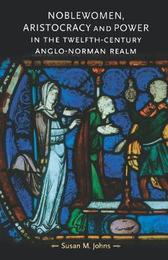
|
Noblewomen, Aristocracy and Power in the Twelfth-Century Anglo-Norman Realm
Paperback / softback
Main Details
| Title |
Noblewomen, Aristocracy and Power in the Twelfth-Century Anglo-Norman Realm
|
| Authors and Contributors |
By (author) Susan M. Johns
|
| Series | Gender in History |
|---|
| Physical Properties |
| Format:Paperback / softback | | Pages:288 | | Dimensions(mm): Height 216,Width 138 |
|
| Category/Genre | British and Irish History
Genealogy, heraldry, names and honours |
|---|
| ISBN/Barcode |
9780719063053
|
| Classifications | Dewey:306.0942 |
|---|
| Audience | | Undergraduate | | Postgraduate, Research & Scholarly | | Professional & Vocational | |
|---|
| Illustrations |
Illustrations, black & white
|
|
Publishing Details |
| Publisher |
Manchester University Press
|
| Imprint |
Manchester University Press
|
| Publication Date |
10 July 2003 |
| Publication Country |
United Kingdom
|
Description
This is a study of noblewomen in 12th-century England and Normandy, and of the ways in which they exercised power. It draws on a rich mix of evidence to offer an important reconceptualization of women's role in aristocratic society, and in doing so suggests new ways of looking at lordship and the ruling elite in the high Middle Ages. The book considers a wide range of literary sources, such as chronicles, charters, seals and governmental records, to draw out a detailed picture of noblewomen in the 12th-century Anglo-Norman realm. It asserts the importance of the life-cycle in determining the power of these aristocratic women, thereby demonstrating that the influence of gender on lordship was profound, complex and varied. This work should be of importance to specialists in history and medieval studies, as well as those interested in the experience of women and those working on lordship and feudalism.
Author Biography
Susan M. Johns was Lecturer in Medieval History at the University of Huddersfield 1994-97 and now teaches at the University of Sheffield -- .
Reviews"This is a highly original and ambitious book which has no modern equivalent. Theoretically up-to-date and innovative, it reaches back into conventional historiography and offers new and exciting insights into the subject."--David Bates, University of Glasgow
|